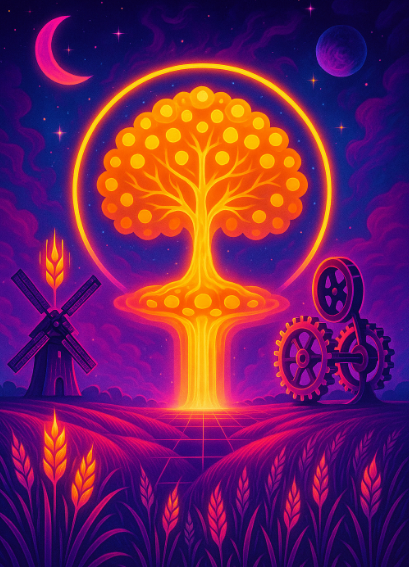Chaos to Order: Realigning Systems for Wealth, Growth, and Stability
Popular articles
Global systems—agriculture, economics, demographics—are fracturing, plunging into chaos from decades of misaligned incentives. Wealth has concentrated in financial hands, while creators and builders, the engines of progress, see diminishing returns. This paradigm breakdown stems from a core disconnect: effort and risk no longer match reward. Yet, order can emerge by syncing the psychological drives and practical needs of these parties—creators who innovate, builders who produce, and financial interests chasing yield. The financial sector, desperate for growth in a stagnating world, needs the output of creators and builders to fund, driving an alignment that redistributes wealth and restores balance.
The psychological rift is clear. Creators—engineers of AI, architects of sustainable tech—thrive on solving problems, but their incentive erodes when profits flow to speculators, not them. Builders—farmers, manufacturers, community organizers—seek stability and purpose, yet face unrelenting risk with little payoff as banks and investors skim the top. Financial interests, meanwhile, are wired for yield. In a world of low interest rates and sluggish growth—global GDP expansion dropped from 4.8% in 2010 to 2.9% pre-pandemic—they hunt desperately for returns. The old system starved the first two while overfeeding the third, hoarding wealth upward. The result? Chaos—depleted soils, hollowed economies, shrinking populations.
Agriculture exemplifies the shift to order. Industrial farming’s collapse—70% of arable land degraded since 1950—leaves food security shaky. Creators offer solutions: robotic harvesters, data-driven soil regeneration. Builders implement them, turning small plots into resilient yields. Financial players, facing bond yields near zero, need growth engines like these—say, a 5% return from a local farm network versus 1% from treasuries. Alignment works when creators gain patents or equity, builders secure ownership stakes, and financiers tie profits to output. Wealth distributes by effort: the innovator’s breakthrough, the farmer’s harvest, the investor’s capital all earn their share. Chaos—unpredictable shortages—yields to order: predictable abundance.
Economically, the bipolar world disrupts old flows. Trade wars and currency shifts choke traditional investments, pushing financial interests toward new frontiers. Creators build decentralized systems—blockchain markets, crypto-backed trade—offering efficiency and scale. Builders adopt them, stabilizing local commerce against global tremors. Financiers, starved for yield as stock markets plateau (S&P 500 annualized returns fell from 13% in the 1980s to 8% recently), fund these ventures, but only profit as adoption grows. Risks sync: creators stake their ingenuity, builders their labor, financiers their capital. Wealth splits accordingly—no more siphoning—turning economic chaos into structured opportunity.
Demographic decline mirrors this. Aging societies—Japan’s workforce down 15% since 2000—threaten fiscal collapse. Creators design AI care systems and affordable housing grids. Builders deploy them, easing family burdens. Financial sectors, eyeing pension shortfalls and a shrinking tax base, need the growth these spark—say, a revitalized economy yielding 3% GDP gains versus stagnation. Funding flows when rewards reflect input: creators earn from scalable tech, builders from livable communities, financiers from long-term stability. Chaos—unsustainable aging—shifts to order: balanced renewal.
The financial world’s hunger for growth is the linchpin. With traditional avenues drying up—real interest rates negative in much of Europe—they need creators and builders to generate yield. A regenerative farm, a blockchain hub, a demographic fix—these aren’t charities; they’re investments with returns tied to real value. Psychologically, creators gain purpose through impact, builders security through ownership, financiers confidence through sustainable profit. Practically, wealth redistributes as risks align: no party thrives unless all do. The breakdown of old paradigms—centralized, extractive—gives way to a system where funding follows function, and effort drives reward.
This alignment isn’t theoretical. Pilot farms in the Netherlands triple yields with tech and shared stakes. Crypto co-ops in Africa bypass banks, splitting gains across contributors. The arguments connect: chaos thrives on inequity; order demands balance. Financial need meets human drive, funding the shift while ensuring creators and builders aren’t left behind again.
Subscribe to unlock premium content
Sed at tellus, pharetra lacus, aenean risus non nisl ultricies commodo diam aliquet arcu enim eu leo porttitor habitasse adipiscing porttitor varius ultricies facilisis viverra lacus neque.
The Great Wealth Generation Act 1.0

The Great Democracy Restoration Act

UK Nutrition Act 1.0

The Great Wealth Generation Act 1.0

The Great Democracy Restoration Act

The Great Wealth Generation Act 1.0







